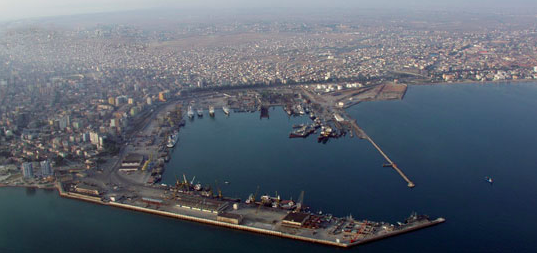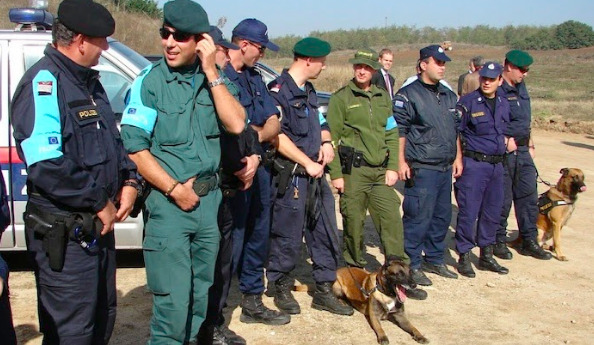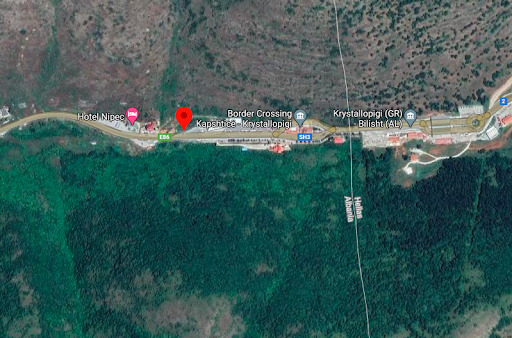Four BVMN reports describe pushbacks from the port city of Durrës, 37 kilometres away from the Albanian capital, Tirana, on the 5th of February 2021 (1,2,3).
The respondent is a 25-year-old Algerian man. He was pushed back three times from Albania to Greece. The first pushback was on the 11th of January, the second on the 5th of February and the third one happened three days later on the 8th of February after he was apprehended on his way to Tirana, Albania.
For approximately five and a half months, the respondent had been staying in what he described as a “hotel” in Durrës. According to the respondent, it was here. He detailed that the hotel was “yellow with brown stripes on the side and five stories high.”
The owner of the hotel is known by the residents as “legraa”, which means “bald” in Algerian Arabic dialect.
The location of the hotel indicated by the respondent is mirrored in the following reports.
The respondent recalled two previous incidents at the hotel involving the police before the one on the 5th of February. One occurred at the end of November, the respondent was able to flee the site in time and was not apprehended and pushed back with the other residents of the building. At the beginning of January, approximately on the 11th, he was apprehended at the same site, leading to a pushback to Greece. From the Albanian-Greek border, the respondent travelled for a week to make his way back to the city of Durrës.
On the 5th of February, in the early hours of the morning, between 6.30 and 8.00 AM, a group of Albanian police officers, wearing dark blue uniforms, started knocking on the doors of the hotel rooms.
The respondent could not recall exactly how many officers were in the building but they were in his words “a lot.”
The respondent was in a room with three other men on the second floor. When officers started knocking on their door the four men did not open it for them and held the door shut. After an hour of knocking, they stopped and appeared to leave. Shortly after this, the officers broke the window of the hotel room on the other side. They could reach it easily because stairs are connecting all the balconies.
Two or three of the officers entered through the window. The respondent, still inside the room, was holding the door key. One of the officers saw this, walked over to him and reportedly slapped the respondent twice across the cheeks.
After this incident, all of the men in the room were brought outside the hotel by the police. The group of four was made to wait there for five minutes until an Albanian police van arrived at the location. They were the only ones in front of the building at this point. According to this report, the vehicles were white Mercedes Vitos.
“We were the last people, they took so many people before us so they were trying to open our door for like an hour. And they didn’t open the door for them.”
Then the group was loaded into said police van. The respondent described it as having a small cell inside and a police sign on the side of the vehicle. The respondent recalled seeing only one van. According to him, they were the last ones being taken from the hotel. That is why in the other reports, describing the exact same pushback respondents reported seeing approximately five vehicles one hour before when most of the people on the move were taken.
The respondent recalled that the driver of the van was wearing the official Albanian police uniform while the officer sitting next to him was dressed in civilian clothing.
The drive took approximately 4 minutes until they reached the port area of Durrës. They were brought to a station inside the port.

The respondent and his group were brought into what the respondent called a “garden”. This correlates with reports of the same event calling the location, where people on the move were being held, a “courtyard.”
Here he observed approximately 50-60 more people on the move. The respondent recognised a lot of them from the hotel.
Some others were picked up from the streets of Durrës. Testimony of an Algerian man arrested in the streets of Durrës can be found here.
The respondent recalled that there was at least one minor in the group. He had crutches to help him walk. This young man was also interviewed by the Border Violence Monitoring Network. His testimony can be found here.
The group had to sit down and wait in this “yard” for approximately six hours, while police officers were surrounding them.
“They were so many police officers but most of them were undercover police and some of them with the uniform.”
They were not allowed to use toilets during this time.
The respondent recalled that some members of the group were trying to talk to the police officers present because they feared that they would be pushed back. Two people self-harmed.
“Okay so some people wanted to run away and some other people wanted to stab themselves with the knives because they were complaining about the pushback and they were asking to where they are gonna take them, where the police is going to take them, […]”
According to the respondent, two members of the group self-harmed by cutting themselves. They used small knives and also sharp rocks, which they found in their surroundings.
The wounded were taken to a nearby hospital and reportedly brought back half an hour later.
Following this incident, the officers at the police station called for reinforcements. Four police officers arrived at the yard on two motorcycles. The respondent described how these officers had red bands on both their arms and were carrying extendable metal batons, which became full size when a button on the side was pushed.
The respondent recalled that the newly arrived officers singled out people from the group to beat.
“They [the officers] came specifically for the people that wanted to stab themselves and people who were complaining and asking the police why we come here. They didn’t beat everyone they beat just the people asking and trying to run away.”
The officers with the red armbands took the singled-out people into the police station and beat them with their metal batons for approximately ten minutes. The respondent was not beaten.
At approximately 2 PM. the group was loaded in batches of 6 into the same vans that brought them to the yard. The respondent recalled that he and the rest of the group were handcuffed together. The authorities used one pair of handcuffs for every two people.
They drove approximately two minutes until they arrived at another building. No signs were showing that it was an official police building.
“There was nothing specific about police or like, [he said] it not really belongs to the police.”
At this location, the group’s fingerprints and pictures were taken. Photos were only taken of the ones that did not have fingerprints yet.
“If there are new people they take their fingerprints, they do like the procedure from the beginning till the end, if someone had already their fingerprints they will just check it and they will put him in the back.”
At this point, the respondent requested asylum. He was told that there was no asylum office.
When some of his friends asked the same question, they were ignored by the authorities. The respondent remembered enquiring what will happen to them:
“When you ask a police officer, the police officer tells you they will take them to Tirana camp. They promised them to take them to a camp there.”
The process took approximately 15 minutes before the batches of six people were taken back to the yard in one of the same vans.
Back in the yard, they were held for around two more hours. After an hour a white Peugeot Partner arrived, driven by a man in civilian clothing.
The man unloaded numerous plastic bags that displayed the insignia of the European Union. He gave them to another man in civilian clothing, whom the respondent alleged was an “undercover police officer”.
He then distributed the bags to the group.
In these bags, the respondent found a tomato, cheese, bread, two bottles of water, a toothbrush, and toothpaste.
Around an hour later, a “big white bus” arrived. One police officer confiscated the mobile phones of a group of 60 men and put them in a plastic bag. They were then loaded into the bus. Two of the officers with the red bandages and expendable metal batons entered the bus as well.
Two cars drove in front of the bus to escort it. One of them was the van that was previously used for transporting the group from the hotel, whereas the other was a smaller car.
Both of the vehicles had “police” written on them.
The respondent explained that the drive took approximately three and a half to four hours.
According to the respondent, the bus stopped in the middle of a forest, close to the border because it could not drive any further. When the group exited the bus, they were met by approximately seven officers. The respondent described them as wearing dark blue uniforms and black ankle-length jackets. They were carrying wooden batons. The respondent referred to them as “NATO-Frontex” and recalled seeing the German flag on a yellow bandage on the left arm of the officers.
“Just in the left arm yellow bandage with the German flag.”
The language they spoke to each other sounded to the respondent like German. To the group, they spoke in English.

The Albanian officers gave the bag full of mobile phones over to the authorities the respondent claimed to be Frontex. The respondent remembered:
“When they asked for the phones they said until we reach this place. Which [we] didn’t know which place.”
According to the respondent, it was approximately 6.30 PM. when the group was forced to walk for twenty minutes with the seven officers. The respondent described the situation the following way:
“It was snowing and they walked in the small small roads inside the woods and they throw us out in nowhere and we didn’t have the maps.”
The so-called “Frontex officers” led them to the top of a mountain, on the Albanian side, said the respondent. Before they left, one of the officers gave the plastic bag full of phones back to one person in the group.
“Some of them [the people] lost their phones, some of them drop it in the snow.”
At this point, the group of approximately 60 men split up into smaller groups and went different ways. The respondent and his group, consisting of six men from North Africa, decided to stay in Albania and started walking in the direction of the capital Tirana.
On the 8th of February, after three days of walking the respondent and his group were apprehended again.
It occurred around 5 PM when the group was taking a break, eating dinner close to the Devolli River, approximately here. There was a big road that could be seen from the spot where they were resting. A white car of the brand Dacia Duster passed by and stopped abruptly after seeing the group. Two police officers exited the car. They were wearing a “different uniform” than the Albanian police.
“They had like advanced equipment.”
The respondent recalled seeing once again a yellow band and a German flag on their arms.
The officers ran towards the men.
“From the car, they got out of the car and ran toward them, but he said we didn’t run away, we were eating. As far as he understood that the police officer when he came to them he called his friend and told him that the people are eating so they were just waiting for them to finish the food.”
After they finished eating, the group was taken to the car and another van, that the officers had called for in the meantime. In this van, the respondent found two other people already sitting inside.
“So and when the car came they found that inside the van there is the guy with the crutches, the minor and his friend.”
It was the same minor with the crutches, the respondent mentioned in his first pushback from the hotel in Durrës to the border area.
From this point of apprehension, the group, the minor and his friend were all driven to a small camp close to the border. The location of this camp is exactly here, next to the Border Crossing Kapshticë – Krystallopigi, and has been mentioned in multiple previous reports.

At this camp, the group’s fingerprints were taken once more. Through this, the authorities learned that they were pushed back from Durrës before. The group of men was left inside a room in the camp.
“It was so cold outside so they put them inside rooms, inside the camps, in front of the heaters”
An hour later officers who were wearing long coats reaching their ankles loaded the respondent and the six men he was travelling with, in a four by four car, which the respondent described as “quite old”. The minor with the crutches and his friend were left at the camp at this point.
“[…], after 1 hour they took them to the border. But this time they put them inside the Greek side, close to this church.”
The group was then driven to the Greek-Albanian border. The drive took around twenty minutes. It was approximately 8 PM when they arrived in the border area. The group was deposited on the Greek side of the border. The respondent stated that the location was approximately here.
The men slept in an abandoned building close to the church and made a fire to keep warm. In the morning they started walking towards Kastoria, Greece.
Approximately 27 kilometres before the city of Kastoria they were stopped by Greek police officers driving a white van. The respondent recalled the interaction with them:
“The police, they talked to them in English, they were nice to us and they told them, where are you going now? [We] said we don’t have money we don’t have food and we want to go back to Thessaloniki so they uploaded us and they went to Neapoli”
From Neapoli, the group bought bus tickets and took a bus to Thessaloniki the next day, the 10th of February.
